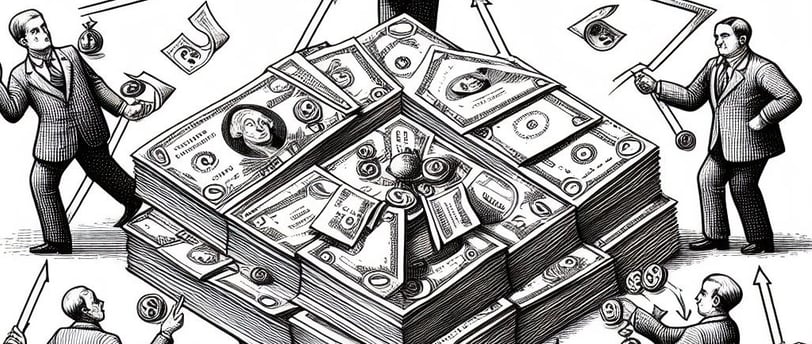How Can You Spot a Ponzi Scheme Before It's Too Late?
Uncover the mechanics of Ponzi schemes, their history, and impact on victims. Learn to identify red flags and protect your investments from these fraudulent schemes with expert insights and preventive measures.


Ponzi schemes are a type of financial fraud that promises high returns to investors by using funds from new investors to pay earlier investors. Named after Charles Ponzi, who orchestrated one of the most infamous schemes in history, these fraudulent investment ventures have deceived countless individuals and caused significant financial losses. In this article, we will delve into the deceptive world of Ponzi schemes, exploring their origins, operations, impact on victims, and notable examples. Furthermore, we will provide valuable insights on how to recognize the red flags and protect yourself from becoming ensnared in such fraudulent investments.
Origins of Ponzi Schemes
The history of Ponzi schemes can be traced back to the early 20th century when Charles Ponzi, an Italian immigrant, devised a fraudulent investment scheme that promised investors massive returns within a short period. Ponzi claimed to exploit international postal reply coupons, taking advantage of differences in their values across countries. However, his scheme was built on a foundation of deception as he used funds from new investors to pay earlier investors, rather than generating legitimate profits.
Ponzi's scheme eventually collapsed, leading to his arrest and subsequent imprisonment. Despite his downfall, his name became synonymous with this type of financial fraud.
How Ponzi Schemes Operate
Ponzi schemes operate by enticing investors with promises of high returns on their investments. The scheme's orchestrator typically presents an investment opportunity that seems too good to be true, offering consistent and substantial profits. These fraudsters often target individuals who are seeking quick financial gains or are attracted to the allure of high returns.
Once investors are lured into the scheme, the fraudster uses their funds to pay off earlier investors, creating the illusion of legitimate returns. This process continues as long as new investors are brought in, providing a constant stream of funds to sustain the scheme. However, since the returns are not generated through legitimate investment activities, the scheme eventually collapses when the influx of new investors slows down or stops altogether.
Impact on Victims
Ponzi schemes can have devastating consequences for the individuals who fall victim to them. Investors who are initially enticed by the promise of high returns often find themselves in a precarious situation when the scheme collapses. The funds they invested are typically lost, leaving them in financial ruin.
Moreover, Ponzi schemes can have a ripple effect, causing significant harm to the broader community. When these schemes collapse, the financial losses incurred by investors can lead to bankruptcies, job losses, and even the closure of legitimate businesses. The social and economic impact can be far-reaching, affecting not only the victims but also the overall stability of the financial system.
Notable Examples of Ponzi Schemes
Over the years, several high-profile Ponzi schemes have made headlines, leaving a trail of financial ruin in their wake. One such example is the Bernie Madoff scandal, which came to light in 2008. Madoff, a former chairman of the NASDAQ stock exchange, orchestrated a massive Ponzi scheme that defrauded investors of billions of dollars. His scheme operated for decades, with Madoff using new investments to pay off earlier investors, all while creating the illusion of consistent profits.
Another notable example is the scheme orchestrated by Allen Stanford, a wealthy financier who promised investors high returns through the sale of certificates of deposit issued by his bank in Antigua. However, the funds were not invested as promised, and instead, Stanford used them to finance his lavish lifestyle and fund other business ventures. When the scheme collapsed, it resulted in billions of dollars in losses for investors.
Recognizing Red Flags and Protecting Yourself
While Ponzi schemes can be highly deceptive, there are red flags that individuals can watch out for to protect themselves from falling victim to such fraudulent investments. Some key warning signs include:
Unrealistic Returns: Be wary of investment opportunities that promise consistently high returns with little to no risk. If an offer seems too good to be true, it likely is.
Lack of Transparency: Legitimate investment opportunities should provide clear and transparent information about their operations, including how they generate returns. If the details are vague or difficult to obtain, it may be a sign of a potential Ponzi scheme.
Pressure to Recruit: Ponzi schemes often rely on a continuous influx of new investors to sustain the illusion of profitability. If you feel pressured to recruit friends or family members into an investment opportunity, exercise caution.
Unregistered Investments: Ensure that the investment opportunity is registered with the appropriate regulatory authorities. Legitimate investments are typically subject to regulatory oversight.
Unlicensed Sellers: Verify that the individuals offering the investment opportunity are licensed to do so. Unlicensed sellers may be operating outside the bounds of the law.
By staying vigilant and conducting thorough due diligence, individuals can significantly reduce their risk of falling victim to a Ponzi scheme. It is essential to consult with trusted financial advisors and conduct independent research before making any investment decisions.
Conclusion
Ponzi schemes continue to exploit the dreams and aspirations of unsuspecting individuals, perpetuating a cycle of financial fraud and devastation. Understanding the origins, operations, and impact of these fraudulent schemes is crucial in protecting oneself from becoming ensnared in their deceptive web. By recognizing the red flags and exercising caution when approached with investment opportunities that seem too good to be true, individuals can safeguard their financial well-being and avoid falling victim to the deceptive world of Ponzi schemes.
